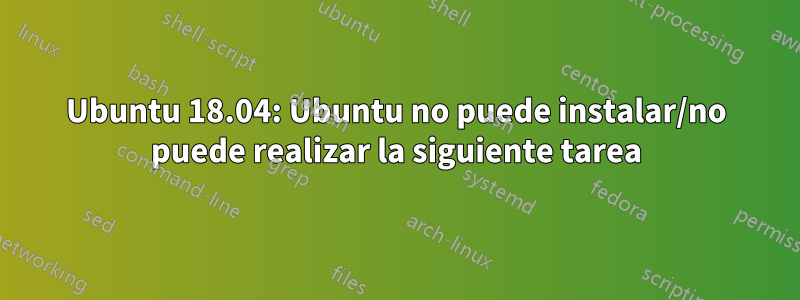
Durante los últimos días, cada vez que intento instalar una nueva aplicación, aparece
ubuntu unable to install:
cannot perform the following task:
... sin nombre de aplicación ni tarea en la lista. Lo intenté
sudo apt update
sudo apt upgrade
sudo apt autoremove
No hay mejores resultados después. Siendo extremadamente novato, no estoy seguro de qué intentar a continuación. ¿Alguna idea?
¡Gracias de antemano por tu ayuda!
Después de algunos intercambios aquí y allá, me recomendaron agregar esta información:
gato /etc/apt/sources.list
# deb cdrom:[Ubuntu 16.04.2 LTS _Xenial Xerus_ - Release amd64 (20170215.2)]/ xenial main restricted
# See http://help.ubuntu.com/community/UpgradeNotes for how to upgrade to
# newer versions of the distribution.
deb http://archive.ubuntu.com/ubuntu bionic main restricted
# deb-src http://fr.archive.ubuntu.com/ubuntu/ xenial main restricted
## Major bug fix updates produced after the final release of the
## distribution.
deb http://archive.ubuntu.com/ubuntu bionic-updates main restricted
# deb-src http://fr.archive.ubuntu.com/ubuntu/ xenial-updates main restricted
## N.B. software from this repository is ENTIRELY UNSUPPORTED by the Ubuntu
## team. Also, please note that software in universe WILL NOT receive any
## review or updates from the Ubuntu security team.
deb http://archive.ubuntu.com/ubuntu bionic universe
# deb-src http://fr.archive.ubuntu.com/ubuntu/ xenial universe
deb http://archive.ubuntu.com/ubuntu bionic-updates universe
# deb-src http://fr.archive.ubuntu.com/ubuntu/ xenial-updates universe
## N.B. software from this repository is ENTIRELY UNSUPPORTED by the Ubuntu
## team, and may not be under a free licence. Please satisfy yourself as to
## your rights to use the software. Also, please note that software in
## multiverse WILL NOT receive any review or updates from the Ubuntu
## security team.
deb http://archive.ubuntu.com/ubuntu bionic multiverse
# deb-src http://fr.archive.ubuntu.com/ubuntu/ xenial multiverse
deb http://archive.ubuntu.com/ubuntu bionic-updates multiverse
# deb-src http://fr.archive.ubuntu.com/ubuntu/ xenial-updates multiverse
## N.B. software from this repository may not have been tested as
## extensively as that contained in the main release, although it includes
## newer versions of some applications which may provide useful features.
## Also, please note that software in backports WILL NOT receive any review
## or updates from the Ubuntu security team.
# deb-src http://fr.archive.ubuntu.com/ubuntu/ xenial-backports main restricted universe multiverse
## Uncomment the following two lines to add software from Canonical's
## 'partner' repository.
## This software is not part of Ubuntu, but is offered by Canonical and the
## respective vendors as a service to Ubuntu users.
deb http://archive.canonical.com/ubuntu bionic partner
deb-src http://archive.canonical.com/ubuntu bionic partner
deb http://archive.ubuntu.com/ubuntu bionic-security main restricted
# deb-src http://security.ubuntu.com/ubuntu xenial-security main restricted
deb http://archive.ubuntu.com/ubuntu bionic-security universe
# deb-src http://security.ubuntu.com/ubuntu xenial-security universe
deb http://archive.ubuntu.com/ubuntu bionic-security multiverse
# deb-src http://security.ubuntu.com/ubuntu xenial-security multiverse
deb https://dl.winehq.org/wine-builds/ubuntu/ bionic main
# deb-src https://dl.winehq.org/wine-builds/ubuntu/ bionic main
ls /etc/apt/sources.list.d -1
megasync.list
megasync.list.distUpgrade
megasync.list.save
slack.list
slack.list.save
teamviewer.list
Respuesta1
Debe establecer la configuración de proxy adecuada: https://help.ubuntu.com/community/Ap...e_a_http-proxy
Nota utilizar el comando
Código:
sudo -H gedit
en lugar de gksudo, ya que gksudo ya no existe.
Editar: como el enlace no existe, prueba esto
Apt carga todos los archivos de configuración en /etc/apt/apt.conf.d. Allí podemos crear una configuración específica para nuestro proxy, manteniéndola separada de todas las demás configuraciones.
Cree un nuevo archivo de configuración llamado proxy.conf.
sudo touch /etc/apt/apt.conf.d/proxy.conf
Abra el archivo proxy.conf en un editor de texto.
sudo vi /etc/apt/apt.conf.d/proxy.conf
Agregue la siguiente línea para configurar su proxy HTTP.
Acquire::http::Proxy "http://user:[email protected]:port/";
Agregue la siguiente línea para configurar su proxy HTTPS.
Acquire::https::Proxy "http://user:[email protected]:port/";
Guarde sus cambios y salga del editor de texto.
Su configuración de proxy se aplicará la próxima vez que ejecute Apt.


